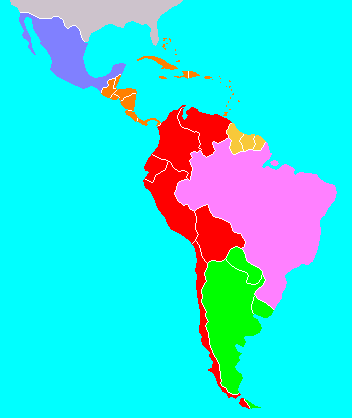
Latin America is well represented within the ORCID team. Three of our developers (Manuel Calvo, Angel Montenegro, and Jeffrey Perez) are Costa Rican; our regional Community Support Specialist – Ana Cardoso – is Mexican; while Ana Vera Wynne, who’s responsible for the US and Canada, and based in Boston, MA is Brazilian, and Gabriela Mejias, responsible for the Middle East & Africa, based in Berlin is Argentinian. And, I am writing this post from Mexico City, where I’m living for the next few months. So, Latin America is close to our heart!
ORCID has engaged with the community in Latin America since before we launched the Registry. Conversations about national and international research information management naturally included Lattes, the CNPq platform for managing researcher profiles used in Brazil and some neighboring countries and seen as a model for similar funder-managed platforms in the US and Europe. ORCID was seen as a way to connect information across these platforms, and both ease reporting burden for researchers and improve the information available to the systems.
Less than a year after the launch of the Registry, we made the Registry interface available in Spanish, and Portuguese followed about a year later. These local language interfaces were and are supported by our community, to ensure the information is presented in a meaningful way. Brazilian usage of the Registry has been among the top 10 of all countries since our launch, and Spanish and Portuguese-speaking users, combined, make up our second-largest group of users after English users. In 2016, Latin America accounted for 8% of total usage of the ORCID Registry; Brazil was the sixth highest user of the Registry; and our Spanish (7%) and Portuguese (5%) interfaces were the second and third highest non-English language interfaces, driven in large part by researchers in Latin America.
We first started engaging directly in Latin America in 2015, with visits to Peru and Brazil. Shortly after, we were very happy to welcome on board a staff member based in Latin America, a Brazilian researcher who knew the region first-hand and who started the work getting organizations integrating ORCID. In 2015, we welcomed our first member from Peru, CONCYTEC, the National Council of Science and Technology, who have been working to integrate ORCID into their national CV system.
Last year we held regional workshops in Brazil and Colombia and presented at several local and regional conferences. These, together with the help of our supporters and partners in the region, are helping to build an ORCID community of users.
As part of this growth, we welcomed three major Brazilian universities as ORCID members: Universidade Estadual Paulista, Universidade de Campinas, and Universidade de São Paulo. UNICAMP and USP are about to launch their first ORCID integrations, and 2017 promises more opportunities in Brazil, including an exciting opportunity to work with a federal agency.
In Mexico, Redalyc, a database of peer-reviewed open access Spanish and Portuguese language journals, has been a member since 2014. In early 2016, they launched a very effective integration that both allows researchers to connect their iD to their Redalyc profile, and to easily exchange data between it and ORCID – a great example of interoperability. There are now 15,000 ORCID iDs in their system, 10,000 of which were registered via Redalyc. We also welcomed two new members, El Colegio de México and Universidad Autónoma de San Luis Potosí, this past year.
And we were also happy to welcome our first three Colombian members: Universidad del Norte, Universidad del Rosario, and most recently, Universidad de los Andes.
In 2017 we will continue to engage with the Latin American community, through workshops, one-on-one conversations, and through our support desk.
We look forward to seeing you! ¡Nos vemos pronto! Nos vemos em breve!
